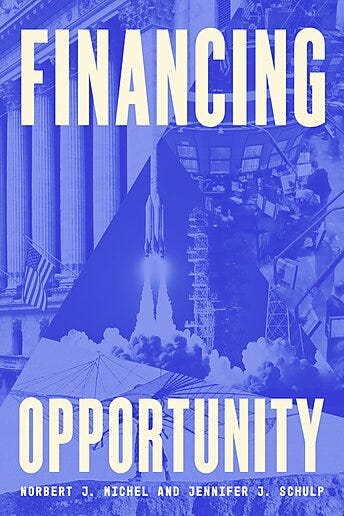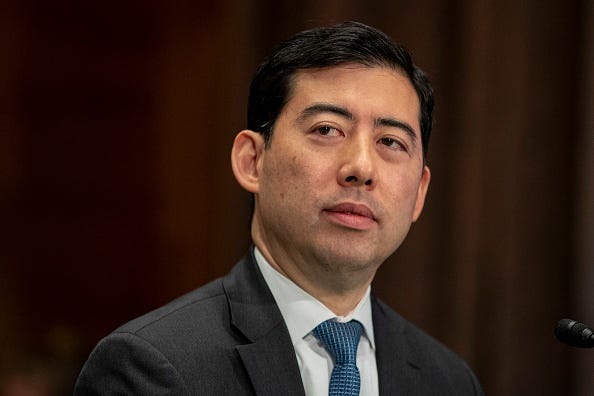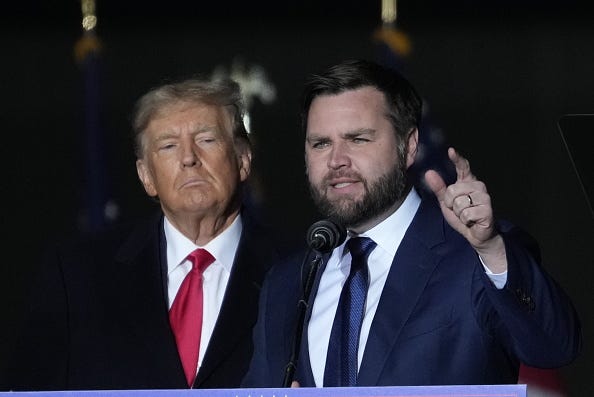Talking Free Markets; SEC Republicans Plot Crypto Shift; Finger Pointing Over Progressive Regulatory Policies
Capitol Account: Free Weekly Edition
With the impending return of Donald Trump, financial regulation is set for a major U-turn. Not surprisingly, there was plenty to write about in our corner of the world. Ahead of the election, we published a two-part series on how the landscape might shift. While the Kamala Harris story was quickly relegated to the dustbin of history, our coverage of the president-elect had some more lasting insights.
Meanwhile at the SEC, the two Republican commissioners are moving to lay out plans for the post-Gensler era. Crypto is a focus. We also took a look at the finger pointing that is already underway, as moderate Democrats wonder if giving control of the oversight agenda to progressives was a wise move. For our Friday interview, we talked with two scholars from the Cato Institute who’ve written a new book on the benefits of financial markets.
Thanks for reading our digest of articles published this week. To get more stories like these in your inbox every weekday evening, click the button below to subscribe.
Friday Q and A: The anticipation of a second Trump administration has every industry and interest group trying to figure out what’s in store – a task made harder because the president-elect himself isn’t married to a particular ideology. He’s a Republican, but his views aren’t necessarily aligned with traditional conservatives, especially when it comes to free markets.
This week, we sat down to discuss Trump’s return and what it may mean for financial regulation with two scholars from the libertarian Cato Institute. Norbert Michel and Jennifer Schulp have grown increasingly dismayed with how critics on both sides of the aisle seem susceptible to rhetorical blasts at Wall Street and arguments that banks and securities firms aren’t working to help average Americans. Their new book, “Financing Opportunity,” takes aim at that notion and warns about the unintended consequences of the government clamping down with an ever-increasing amount of rules.
Read on for Michel’s recollections about his frustrations when he served on the transition team the first time Trump won the White House. Schulp shares her expectations for a whole lot of policy change, especially at the SEC. And they both talk about what finance’s detractors get wrong – on the left and the right. What follows is our (lightly edited and condensed) conversation.
Capitol Account: What will financial regulation be like in Trump 2.0?
Norbert Michel: It's hard for me to get excited one way or the other based on the first Trump administration, because I don't really think that it did a huge amount of positive stuff.
CA: Any particular missed opportunities that come to mind?
NM: I saw an article this morning speculating about what he might do with the Fed and Fed appointments. They didn't mention that, in 2016, he kind of screwed that up. He didn't do any of the things that he said he was going to do. He didn't appoint the people he said he was going to appoint. He could have appointed three more people, and he didn't.
CA: How about other agencies?
NM: The CFPB was pretty bad…[Trump] said he was going to do a big number on Dodd-Frank. They didn't touch Dodd-Frank. That was a campaign thing that he said over and over again. And they didn't change a single line item. They didn't fire Mel Watt from FHFA, they let him run his term out.
CA: You worked on that transition. Were you expecting a bigger overhaul?
NM: I don't think I'm talking out of school, but a lot of…the more radical reform agenda, all of it just got pushed to the side. Not a lot of it – all of it. [Trump Treasury Secretary Steven] Mnuchin literally came into the transition offices and thanked everybody for what they did, and said: `We're not going to do any of this, but thank you for all of your work.’
CA: Some attribute that to Trump appointing traditional Wall Street executives like Mnuchin to key economic and regulatory posts. Will that happen this time around?
Jennifer Schulp: My guess is as good as anyone's, but I will say the SEC stands out as a slightly different case than some of the other financial regulators – because it has been such a centerpiece of what [Trump] has been talking about. We have more of a clear idea about some of the things that he wants to do with the SEC than the other financial regulatory agencies. The SEC plan, at the very least, is to do something big on crypto. That, off the bat, suggests that it might not necessarily be leadership that's just conventional Wall Street.
CA: Chair Gary Gensler has taken a lot of heat from Republicans, and the industry, over his ambitious agenda. Do you see some of his rules being reversed?
JS: There are absolutely things there that are going to be rolled back or shelved. Rolling back is always a tricky prospect. That has been made all the more tricky by some of Gensler's actions that have resulted in poor judicial precedent for the agency…Certainly a lot of things that are in the hopper are going to be stopped. That Reg-Flex agenda will look very different under a Trump administration than under the Biden-Gensler administration. I don't think we'll see human capital disclosures on that list anymore. The predictive data analytics rule that is back on as a re-proposal – maybe something could be considered there, but it's not going to look anything like what Gensler had proposed. We're going to see a lot of change out of the SEC.
CA: There still seem to be a lot of New York finance types advising the president-elect. Do they still hold a lot of sway?
JS: You can look to the broader Trump ecosystem with [Elon] Musk and [Vivek] Ramaswamy…who have been pushing for more radical administrative state reform. Whether that is ultimately reflected in choices is a different story. But I think there are certainly voices within the Trump camp that are interested in making those types of picks.
NM: Maybe a little bit more so than last time. But there was a lot of the ‘drain the swamp’ stuff with [Steve] Bannon – all that kind of crap, and I say crap because they didn't do anything.
CA: Tell us about your book. Why did you decide to write it?
NM: We were seeing, even from some on the Republican side, more and more criticism of financial markets – as this thing that sucks money out of the real economy, that's dangerous and risky and wasteful. That was the primary driver. We felt like we should put something together as a reference to say…that's wrong.
CA: Why is that thinking flawed?
NM: As long as we've had financial markets, people have been making these same complaints…There's a lot of history in the book, both empirical evidence and anecdotal evidence, that shows that the United States became an enormous commercial power very rapidly. It's no accident that its financial markets also grew up rapidly with that commercial activity. We were unique in that we had both a banking and securities, or capital markets, sector that got off the ground very fast – and is one of the main reasons that we grew the way that we did.
CA: The book also stresses that deregulation has been misconstrued
JS: Deregulation is a boogeyman for any financial crisis that we've had, particularly 2008. [But] there simply hasn't been deregulation. The amount of regulation over the financial markets has grown and grown and grown…And in fact, lesser regulated financial markets, as we argue in the book, are more resilient and stronger. The regulation itself is contributing to these crises that we often blame on deregulation…(Friday)
Click here to subscribe and read the full interview.
Thanks for reading. Follow us on X @CapitolAccount and on LinkedIn by clicking here. We’re always looking for stories, so if you have any suggestions on what we should cover (or comments about Capitol Account), shoot us a note. Rob can be reached at: rschmidt@capitolaccountdc.com and Ryan at rtracy@capitolaccountdc.com. If somebody forwarded this to you and you’d like to subscribe, click on the button below. Please email for information on our special rates for government employees, academics and groups: subscriptions@capitolaccountdc.com.
Quick Reversal: In the spirit of “don’t let the door hit you on the way out,” the SEC’s two Republican commissioners are already busy contemplating a complete overhaul of the agency’s policy agenda in light of Trump’s win. While in the early stages – and, sources caution, subject to the blessing of the president-elect and his team – the planning signals a major reversal of the Gensler era, especially when it comes to digital assets.
Most notably, the commissioners are discussing an unusual tag-team approach to running the regulator after Inauguration Day, when Trump is expected to quickly put one of them in charge, sources say. Mark Uyeda would put his hand up to be acting chairman, while Hester Peirce would head a task force charged with holistically reviewing the regulator’s approach to crypto and drawing a clear line on where the SEC’s jurisdiction begins and ends. An aide for Uyeda declined to comment. Peirce, when asked for comment, sent a link to a video for a song called “Rumors.”
The arrangement would be temporary, until Trump picks a permanent leader for the agency. Sources say it would play to each of the commissioner’s strengths and interests. Both have emphasized that they aren’t trying to front-run the Trump transition, but they want people to understand that they are working as a team – one that will be able to hit the ground running on January 20.
Though Peirce has seniority over Uyeda, she has been recently telling people that she has no desire to take on the management responsibilities that come with being acting chair, sources say. That is also an indication that she may leave the agency after her term expires next year.
Taking a leading role on crypto, an area where she has long been engaged, would give Peirce an opportunity to cement her legacy before exiting government. The commissioner has been especially vocal about what she’s called Gensler’s misguided enforcement-first approach on digital assets.
While details are still being worked out, the crypto effort is likely to have broad authority. There is precedent at the SEC that allows a chairman (even an acting one) to delegate the powers of the office to the head of a task force. If that happens, Peirce could set an agenda and muster resources, sources say, including using staff from various divisions and offices.
The new entity may also look at crafting so-called no-action relief, staff letters that interpret how SEC rules apply, or don’t, in a specific situation. Crypto advocates and securities lawyers (including Peirce and Uyeda) have argued that no-action letters could pave the way for digital asset firms to comply with the securities laws without subjecting them to the same regulations that stock exchanges or brokerages have to follow.
Another important mission will likely be reassessing the SEC’s enforcement posture toward crypto – and reviewing the numerous cases that the regulator has brought. That may include studying whether to pause, or potentially drop, high-profile litigation against firms like Coinbase and Ripple, sources said.
Uyeda, whose views are strongly aligned with Peirce on digital assets policy, wouldn’t be a member of the task force. Instead, sources say, he would concentrate on running the agency and developing new priorities. At the top of his list: taking a close look at the regulatory agenda – what’s on it, but also what should be. While any pending Gensler proposals are likely to be deep-sixed, there are also questions about what existing rules should be repealed.
The commissioner, one source emphasized, will “be very focused on cleaning up Gensler’s mess.”…(Thursday)
Click here to subscribe and read the rest of the article.
Finger Pointing: Trump’s victory certainly portends a wholesale rethinking of financial regulatory policy. Less certain is the fallout within the Democratic party, especially the influence of progressives who spearheaded the Biden administration’s oversight agenda.
As Washington prepares to become a Republican town again, Capitol Account spoke with people across the political spectrum for their take on the election fallout. Suffice it to say, industry leaders are quite happy – and looking forward to a very different tone taking hold. One other common emotion (see below) is relief, and some schadenfreude, over the impending departure of SEC Chair Gensler.
Among liberals, on the other hand, the GOP’s strong performance in the presidential and congressional races is prompting a whole lot of finger-pointing. While financial regulation wasn’t a ballot box issue, some moderate Democrats nevertheless say the results raise questions about the wisdom of Biden’s liberal economic and regulatory approach – and in turn, whether the likes of Gensler, Lina Khan and Rohit Chopra ought to continue to drive the bus.
The more charitable reading for progressives – one being pushed hard by the Biden regulators’ defenders – is that the verdict represents a failure of the Democratic party’s salesmanship, not its policies. Trump and J.D. Vance, progressives argue, seem to have succeeded in convincing voters that Republicans are fighting for working people against the Powers that Be, including Wall Street.
“Populist economics is popular,” says Jeff Hauser, executive director of the Revolving Door Project, which has worked to get progressives in key government posts. The problem, he contends, is that Biden and Harris never fully embraced it.
“The administration never did anything to uplift the populist accomplishments,” Hauser notes. “And so they antagonized lots of capital, be it crypto or banking or private equity, without reaping the political benefits. It ended up being counterproductive, not because the voters repudiated it but because the voters never became aware.”
Others in the liberal camp pointed to the election results in “split screen” states like Missouri, where voters backed Trump as well as progressive positions on minimum wage, paid sick leave and abortion – suggesting that Democratic policies were popular in the state, even if Harris didn’t win.
“Find me a Republican [campaign] ad that attacked the government for a stringent regulation of monopolies or the CFPB going after how banks interact with their customers,” Hauser asks, rhetorically.
“Blaming poor marketing is basically the last refuge of a losing cause,” shoots back Adam Kovacevich, a Democratic lobbyist who is CEO of the Chamber of Progress, a left-leaning advocacy group funded by technology companies. “The reality is, actions are either popular or unpopular. To blame a lack of marketing is the weakest possible response.”…(Wednesday)
Click here to subscribe and read the rest of the story.







